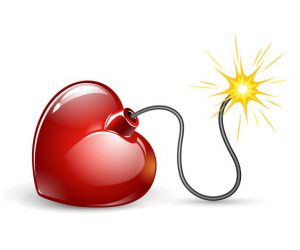Dealing with anger with unjustified blame
If you relate to someone with narcissistic behavior, you will probably recognize the flow of blame at your address. Because, after all, nothing is wrong with the narcissist. Yesterday I listened to a YouTube video clip of an American therapist and he said “Because the narcissist thinks he is enlightened.” Then a bell rang with me.
Yes, if you are enlightened and you see life on earth from the cosmos as being an angel who knows no right and wrong, because everything is in a state of absolute perfection, then you can end up in the trap that you think that you can do or leave everything with someone. After all, everything is divinely perfect. However, we are also human with flesh and blood and therefore have to deal with individual separation.
Whoever has completely separated himself from being human, and therefore does not want to make a connection with the wound that you as a person and soul bears in this unique life, is only focused on avoiding your own human pain, at the expense of of others. And that is easiest for someone who loves you dearly.
HSP-er as mirror of “the narcissist”
As a mirror of the narcissist you are an HSP, you ensure that you actually go inside and try to discover within yourself what you can improve, what your share is in the conflict or the crisis, and what you can do change. As long as this is partly in favor of the person with narcissistic behavior, nothing is wrong.
But if you go for your happiness and make choices that serve you as a person and personality, and that go against the happiness of the ‘narcissist’, then chances are that you will be subjected to gaslighting techniques, where you will be blamed for everything what happens or has happened. Deliberately hurting each other is the result.
The consequences for you as a loving person, who always sees the good in the other and who always has compassion for the other, is that you experience anger and anger. This can come out in various ways. Often it happens by suppressing the anger or reasoning away (by looking for your share and by reflecting). But that anger has a function and a message and it is important to listen to it.
The good side of anger
Anger and anger is fantastic energy in the purest sense of the word. It is your life energy that sets your limits and tells you when someone is going too far. However, we have not learned to deal with anger en masse, and so in relationships with emotional dynamics, we have many opportunities to learn to use our anger as a transformer.
Seven ways to deal with anger
1. You suppress your anger. You act like the anger is not there. You ignore your emotion and you swallow it. That goes without saying, because if you try to express yourself, there is that lump in your throat, the pain in your stomach or the paralysis. You just can’t do it.
2. You openly show your aggression. You attack the other and point the finger at you. You criticize the other and blame him or her. It’s not up to you (this time)!
3. You show hidden or passive aggression. You give silent treatment and you refuse to speak to your partner any longer. You also do this in front of your children. Then you are ice rabbit and you only say the much needed things. You withdraw and you leave contact. You no longer want anything to do with the other person. You refuse to start a conversation, even after supplications or other attempts from the other person.
4. You stand up for your opinion as a warrior in an assertive way, while maintaining respect for the other person’s vision. You stay with yourself with all your energy. You do not need the consent of the other person to be who you are and to speak your truth. By expressing your truth, you show respect for yourself. That’s enough. If you feel attacked, say something like: “I understand how you feel but I want to lead my life in my way and in the way that is right for me. I now choose for myself and for what makes me happy. ”
5. You shift your attention to other things and you refuse to lose yourself in a fight with only losers. You choose to do something else and you make the inner choice to focus your energy on it.
6. You indulge your anger in an innocent manner. You go to the forest and take a pillow with you to save. You take a punching bag to indulge. You can have fun at the gym or through another sport. You are looking for a therapist who works with bodywork and who guides you to safely express the anger the way you want. This means that together you create the circumstances that allow this indulgence to take place safely.
7. You consciously breathe love to your anger and other emotions. You forgive yourself and the other for what happened and you breathe love from your heart to yourself, and then to your partner.
Are you struggling with emotional fluctuations as a result of a relationship with a partner with narcissistic behavior, or are you someone with narcissistic behavior yourself? Perhaps the training “healing of the narcissistic wound” is for you. This will take place from 8 to 11 November 2018. Read more about the program here. In the training we work with the perpetrator-victim dynamics and we are guided by the other world, with the motto: “what was once created from error and pain can also be dismantled and healed.”

